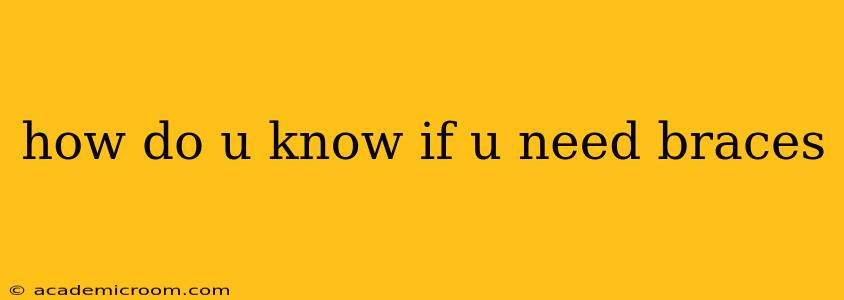How Do You Know If You Need Braces? A Comprehensive Guide
Many people wonder if they need braces, especially as orthodontic advancements make straighter teeth more accessible than ever before. Straight teeth are not just about aesthetics; they significantly impact oral health and overall well-being. This guide will help you understand the signs that suggest you might benefit from orthodontic treatment.
What are the common signs that I need braces?
This is a frequently asked question, and the answer involves several factors beyond just crooked teeth. You might need braces if you experience any of the following:
- Crowded Teeth: Teeth that are overcrowded or tightly packed together can lead to difficulties in cleaning, increasing the risk of cavities and gum disease. This is a major indicator that orthodontic intervention might be necessary.
- Overbite: An overbite occurs when your upper front teeth significantly overlap your lower front teeth. Severe overbites can cause jaw problems and interfere with proper chewing.
- Underbite: An underbite is the opposite of an overbite, where your lower teeth extend out beyond your upper teeth. This can also impact chewing and jaw alignment.
- Crossbite: In a crossbite, some of your upper teeth bite inside your lower teeth. This can lead to uneven jaw growth and facial asymmetry.
- Open Bite: An open bite occurs when there's a gap between your upper and lower teeth when you bite down. This can affect your ability to chew properly and may impact speech.
- Gaps between Teeth (Diastema): While some find gaps aesthetically pleasing, large gaps can be problematic for oral hygiene and bite function.
- Difficulty Chewing or Biting: Persistent problems chewing food or biting into apples could signal an underlying bite issue that braces could correct.
- Jaw Pain or Clicking: This could indicate temporomandibular joint (TMJ) disorder, often linked to bite problems, potentially addressable through orthodontic treatment.
- Speech Impediments: In some cases, misaligned teeth can affect speech clarity.
What are the benefits of getting braces?
Beyond the aesthetic improvements, braces offer several significant advantages:
- Improved Oral Hygiene: Straighter teeth are much easier to clean, reducing the risk of cavities, gum disease (gingivitis and periodontitis), and tooth decay.
- Enhanced Chewing and Biting Function: Correcting bite problems ensures you can chew food effectively and comfortably.
- Improved Speech: In some cases, braces can improve speech clarity by addressing misaligned teeth that might interfere with articulation.
- Reduced Risk of Jaw Problems: Addressing bite issues early can help prevent future temporomandibular joint (TMJ) disorders and other jaw problems.
- Boosted Self-Confidence: A straighter smile can significantly boost self-esteem and confidence.
How can I find out for sure if I need braces?
The only definitive way to determine if you need braces is to consult an orthodontist. They will conduct a thorough examination, including:
- Visual Examination: Examining your teeth and jaw alignment.
- X-rays: To assess the position of your teeth and roots.
- Dental Models: Creating models of your teeth to analyze your bite.
What are the different types of braces available?
Orthodontists offer various brace options, including traditional metal braces, ceramic braces, lingual braces (placed behind the teeth), and Invisalign (clear aligners). The best option will depend on your specific needs and preferences. Your orthodontist will discuss these options with you during your consultation.
At what age should I consider getting braces?
While many people get braces during adolescence, orthodontic treatment can be beneficial at any age. Adults can also achieve significant improvements in their smile and oral health with braces.
Are there any risks or side effects associated with braces?
While generally safe and effective, braces can cause some temporary discomfort, including minor mouth sores, irritation, and pain. These are usually manageable with over-the-counter pain relievers and proper oral hygiene. Your orthodontist will explain any potential risks during your consultation.
This comprehensive guide provides a starting point for understanding the need for braces. Remember, a consultation with an orthodontist is the best way to determine if braces are right for you. They can provide personalized advice and a treatment plan tailored to your specific oral health needs.
